JoeCrozier
Well-known member
No problem! I'm a total rookie and it was the first I'd heard of compression height but I was pretty sure of it.I stand corrected, in my defense I got my info from here at CI tech archive, so it is wrong.
Thank you for all the suggestions! It SEEMS like those are too far off in terms of dimensions. I'll keep lookingWhile you have successfully removed the pistons from the bores if you try to reuse the pistons the next chore will be getting the old rings off without damaging the ring grooves, getting the pistons out will seem like a walk in the park compared to this chore. Since this is a shoestring deal you could try looking at pistons from other engines with a near 3.5 " bore and see if you can find some that have a similar CH and wristpin size. For example Ford 221 V8's and Buick Olds 215 V8's also have a 3.5" bore but I don't know if their CH and wristpin sizes are close. Another thing you can do is check evil bay some vendors on there have old stock pistons for older engines that are sometimes very reasonably priced, its usually from a buyout of a defunct parts supplier or repair shop.But before you drop anything on pistons make sure the block is crack free with water in there it could have frozen.
It really seems like (with a thorough internet search) I can only find two sources of the pistons. The Advanced Auto option I mentioned earlier I think is actually a bust. The two sources I can find are:
-That ebay listing @rocklord mentioned from Australia. ($400 after shipping)
-Egge pistons ($400). A guy on ebay selling 170 pistons (that I also asked if would work in 144's) said he thinks egge is the only company making pistons for 144's. And given what I can find, I believe him.
So I think I'm faced with the decision of somehow saving not-great pistons (assuming my cylinders aren't junk or need to be bored), or dropping $400 on new pistons. I'd find a cheap 144 on craigslist/facebook to steal those pistons but they seem pretty rare. I see plenty of 170's/200's.

